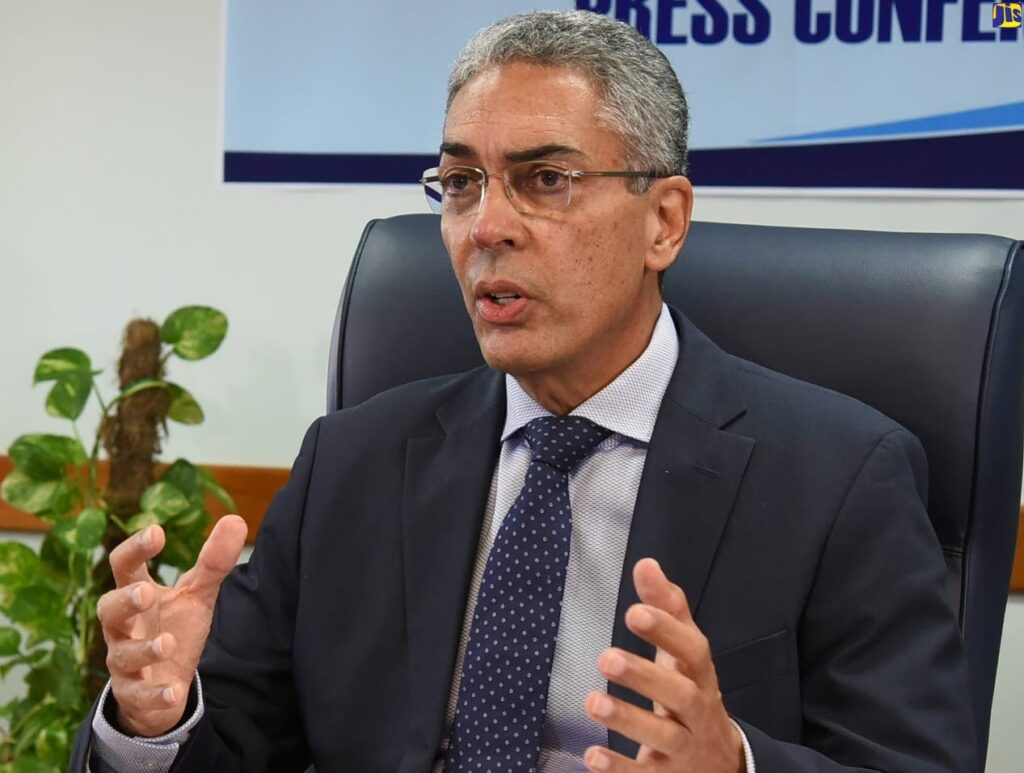BYLES…we believe that participating in [the foreign currency market] at all times is the best process.
BANK of Jamaica (BOJ) Governor Richard Byles has rejected an International Monetary Fund (IMF) call to reduce intervention in the foreign currency market, stating those interventions are the “best way” to prevent erratic volatility in a market that his Senior Deputy Governor Wayne Robinson called “too small and fragile” to leave to its own devices.
“We believe that participating in [the foreign currency market] at all times is the best process,” Byles told the Jamaica Observer when asked to comment on the IMF’s call for it to intervene less often, allowing the Jamaican dollar’s value to be set more by market forces of supply and demand.
However, the governor’s firm stance, outlined during the central bank’s quarterly briefing on Thursday, directly addresses the IMF’s Article IV consultation report in June. The Fund had urged the central bank to “deepen [foreign exchange] markets by reducing surrender requirements and scaling back the BOJ’s foreign exchange intervention (FXI).”
Byles acknowledged the recommendation but defended the bank’s strategy. “We’re always judging whether policies that we currently use remain appropriate… so far, we believe that the current policy of intervention is appropriate,” he said. “So every day, we are buying in the market. That allows us to build up a fund that we can deploy back into the market if and when we feel the market is acting erratically,” Byles told BusinessWeek.
The BOJ deploys these funds back into the market using its Foreign Exchange Intervention Trading Tool (BFXITT). This mechanism is designed to prevent large, short-term swings in the exchange rate that could compromise the bank’s mandate to control inflation. Since BFXITT was introduced in 2017, the central bank has sold almost US$5 billion into the market. This buying is facilitated by a surrender requirement that sees cambios surrendering up to 15 per cent of their FX each day while banks are asked to surrender up to 20 per cent.
He pointed to the results as validation of the BOJ’s judgement. The strategy has allowed the central bank to accumulate nearly US$1 billion in net international reserves over the past year, bringing it to a record US$6.1 billion, while simultaneously keeping exchange rate movement stable and predictable.
Byles argued that this stability is not artificial, but aligns with fundamental economic principles.
“I think you have to look at how has that exchange rate moved over the period of time and you have to measure that against inflation differential,” he said. “So when you look at our inflation rate and United States inflation rate, you’ll see that the differential is quite similar to how the exchange rate has moved.”
He noted that the currency’s annual movement of 1.5 per cent to 2 per cent has directly mirrored the inflation gap between Jamaica and the United States over the last five years.
“So I would judge it on that basis as performing very well because it is keeping us competitive, but it is not creating havoc. It is not sending the exchange rate through the roof. It is not holding it down to be uncompetitive to exporters. So by that measure, it seems to be that it has been successful.”
“It has been our judgement up to now that this is the best way to move forward rather than allowing the market more and more to make the adjustment by themselves,” he further noted.
His stance was bolstered by Senior Deputy Governor Wayne Robinson, who detailed the structural vulnerabilities that make the policy necessary.
“Although the foreign exchange market has grown appreciably in the past 18 years, it is still a small market. Also, flows into the market are very lumpy,” Robinson stated. “So it’s a market that is very subject to huge swings, and it’s a market in which any little movement can end up being very destabilising. The central bank in a market like this has to be very active on both sides of the market. So we have to be buying and we have to be selling.”
Robinson explained that the bank’s main tool for selling, the Bank of Jamaica Foreign Exchange Intervention Trading Tool (BFXITT), is an auction system designed for transparency and efficiency.
“The entire market knows what we’re doing under the rules of the auction, so it’s very transparent,” he said. “But also importantly, being an auction mechanism, it allows for what we call price discovery. In other words, it enables us to sell at rates that are not far off from the market… that are actually consistent with what the market is saying.”
He confirmed that the system is under constant review but is achieving its core goal.
“We continue to review it… And whenever necessary, we will make tweaks and adjustments to the auction mechanism. But it has been working and achieving what we had set out to do when we implemented it.”
